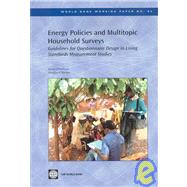
| Introduction | p. 1 |
| Potential value of LSMS surveys for analysis of household energy use | p. 2 |
| Report audience and organization | p. 2 |
| Characteristics of LSMS surveys and specialized household energy surveys | p. 5 |
| Characteristics of LSMS surveys | p. 6 |
| Characteristics of specialized household energy surveys | p. 6 |
| Other distinguishing features of both types of surveys | p. 7 |
| Existing and missing energy questions in LSMS surveys | p. 9 |
| Energy and development outcomes : the issue of causality | p. 11 |
| Importance of LSMS survey data for energy policy analysis | p. 15 |
| Household energy transitions | p. 15 |
| Using LSMS surveys for energy policy analysis | p. 19 |
| Rural electrification and development | p. 22 |
| The way forward | p. 27 |
| Fuel sources module | p. 28 |
| Electricity sources modules (grid and off-grid) | p. 33 |
| Durable goods (light bulbs and appliances) module | p. 37 |
| Electricity and fuels in the community module | p. 40 |
| Conclusion | p. 43 |
| Table of Contents provided by Blackwell. All Rights Reserved. |
The New copy of this book will include any supplemental materials advertised. Please check the title of the book to determine if it should include any access cards, study guides, lab manuals, CDs, etc.
The Used, Rental and eBook copies of this book are not guaranteed to include any supplemental materials. Typically, only the book itself is included. This is true even if the title states it includes any access cards, study guides, lab manuals, CDs, etc.